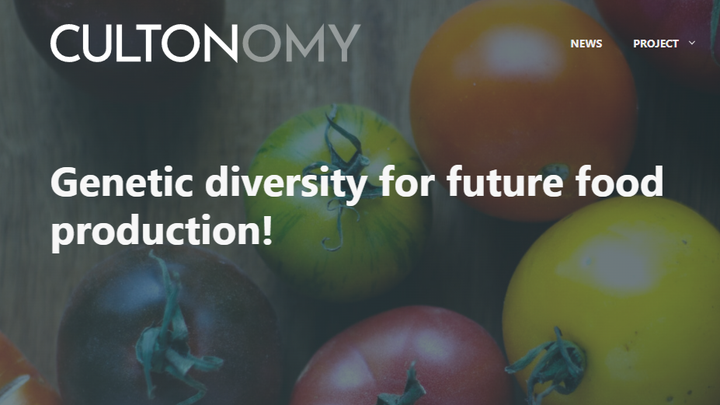
CULTON - the first complete cultonomy
Donation protected
Culton website front photo by Vince Lee on Unsplash
The genetic diversity of the organisms we use for food and other valuable products from nature is significantly reduced. Meanwhile, climate change poses significant challenges to production because life conditions change.
Genetic diversity is essential for several reasons. It allows for local adaptation so that we can grow grapes in Norway or tomatoes in Siberia, and we need a large register to choose from to develop new varieties. Older stable varieties, including locally adapted landraces, are essential to this diversity.
We invite you to participate in our effort to map this diversity in a social network. Together we can exchange seeds and plants, information on growing conditions and diseases, and knowledge for efficient cultivation.

Photo: Bi-O, who initiates this project, is working with variety maintenance of Vossakann, and development of new sunchoke varieties for northern latitudes
A digital backbone for the sustainable human use of the biosphere
Individuals, organisations and small businesses that work with the cultivation of food and other natural products are carriers of knowledge and skills of vital importance to the existence of humanity. Over half of humanity tries to meet their needs based on traditional methods without pesticides, insecticides or artificial fertilisers.
Although modern industrial agriculture has taken over much of the production, many, both in poor and rich areas, know that these traditions carry vast potential to contribute to the future’s sustainable production of vital raw materials. If this potential is to be unleashed, these actors must be helped by new sustainable technology, and not least: well-structured data on all cultivated forms of life.

Photo: Konstantin Krismer, CC, via Wikimedia Commons
Culton – an open free source of quality checked cultonomic info
There are several large databases with close to complete lists of the natural organisms in the biosphere, but concerning the cultivated forms (varieties, breeds, etc.) info is more scattered around in specialised databases. This makes it difficult to get an overview of what exists, which names are correct, which are synonyms, and what data exist to describe them.
This is what the Culton project is initiated to do something about.
We collect as many cultivar names as possible within plants and fungi, animals and cultivated microorganisms and build a competent network to quality check the data sets and the suggestions from the users.
Later, we will expand the data sets horizontally, with descriptions of the cultivars necessary so that the data can be used for further development of new cultivars and breeds, propagation, and cultivation for food and other products.
Building such a global resource is a gigantic task; we must do it together and share data. Therefore, the project will be organised as a non-profit foundation that collects data from all over the world and makes it freely available forever.

Photo: Bi-O
Including images and data from the users
An essential part of the project is the image collection. There are many relevant pictures online, but complicated rights cover many. At Culton, everything must be freely available via Creative Commons (cc) licensing so that the images can be downloaded and used freely or seamlessly integrated via API in various solutions that use Culton data. In addition, we will develop tools and standards so that the image material will be as systematic as possible, so that everyone can use the images to compare and describe characteristics as precisely as possible, and we can build effective image searches.
Data about the users’ location, such as, e.g. soil, local climate and flora and fauna, as well as data from cultivation, will be necessary for building up CULTON’s variety descriptions.

Photo by Nicolas Ladino Silva on Unsplash
Cultonex – a tool for inventory and exchange
Bi-O is also developing the sister project CULTONEX, a tool for network-based exchange of physical material and images and data for CULTON.
Here, in your user area, you can maintain an overview of everything you have of seeds, plants and fungi, animals and microorganisms, and what you develop from propagating material. You can then offer this in a catalogue so that everyone can access a large variety for testing in their locality.
From the CULTONEX app, you could upload images and data directly to CULTON, and otherwise use the system to have an overview of work tasks and what is where in the garden. CULTONEX shall, among other things, contribute to
- test out new varieties with many growers
- contribute to more people developing new varieties
- track and stop disease outbreaks
- inform about rules for import and distribution

Introducing a reformed name system for cultivated organisms
We do one more thing. We are basing the project on a long-proposed reform within the science of systematics: an independent cultonomy based on the concept of culton.
Most people know the so-called binomial name structure for species in nature, which Carl von Linné developed in the 18th century. This is also used as a basis for cultivars, and a carrot cultivar is written e.g. in the following form: Daucus carota ‘Cultivar name’.
But this way of creating cultivar names is problematic, i.a., because the cultivars are often developed so far from the natural forms through hybridisation between species that choosing only one scientific name is at best a half-truth. In addition, cultivar names often change because biologists discover new evolutionary relationships through gene mapping.
Since the Culton project is financially and academically independent, we are now using this unique opportunity to introduce this reform.

Illustration by Bi-O
***
The Culton Foundation is initiated by Bi-O, a company based in Oslo, Norway.
Organizer
Karl Aakerro
Organizer
Oslo


